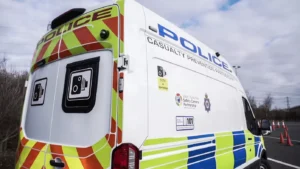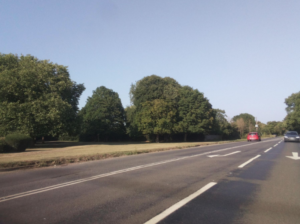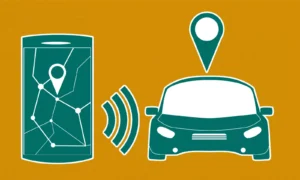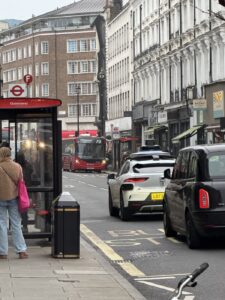The UK’s first-ever zero emission autonomous bus service has reached a key milestone with trials on public roads getting underway in Oxfordshire.
The new service, which is fully electric, will serve Milton Park business, science and technology park near Didcot and Abingdon. The service will improve the way people move both around the park, which is home to 250 companies and 9,000 employees, and the wider Didcot region.
Part of the Mi-Link green travel programme, the Milton Park Circular service 1 is being operated by First Bus. The £4.3m project has been funded by a £3m grant from the UK Government alongside a commercial and private sector partnership.
The UK Department for Transport’s Centre for Connected and Autonomous Vehicles has provided this financial support through Innovate UK, helping drive the project which has been delivered by the consortium comprising a range of experienced and diverse organisations.
Led by First Bus, the consortium comprising Fusion Processing Ltd, Oxfordshire County Council, University of the West of England and Zipabout with Milton Park, as the host location, has brought this five-year project to fruition. The new 16-seat fully accessible single-decker bus will have a safety driver on board at all times to provide a personalised service and information to passengers.
The MultiCAV project is now in its final stages having been established to demonstrate the application of autonomous vehicle technology to real-world service provision. By the time the research project completes at the end of 2023, the service will be connected with Didcot Parkway Railway station; a key Oxfordshire transport hub.
Buses Minister Richard Holden MP joined senior directors of the consortium at Milton Park and was amongst the first to travel on the zero emission autonomous bus as part of a special demonstration.
Janette Bell, Managing Director at First Bus, said: “The launch of the UK’s first zero emission autonomous vehicle is a stellar example of how technology can support modal shift with wide partnership working between local authorities, operators and local business.
“First Bus serves millions of customers in the UK, and we know that so many of our customers take the bus because they care about our planet and reducing their carbon footprint. We’re excited to now be able to offer them an even greener and quieter way to travel, and we cannot wait to hear some feedback on the new buses.”
Richard Holden MP, Parliamentary Under Secretary of State with responsibility for roads and local transport, said: “It’s thrilling to see our £3 million investment help British firms and engineers pioneer new, exciting ideas to achieve our vision of a truly efficient and sustainable transport network.
“The launch of the UK’s first autonomous, zero-emission bus today is yet another key step towards achieving Net Zero, creating high-wage, high-skilled new jobs and opportunities while truly levelling up transport across the country.”
Innovate UK Executive Director for Net Zero, Mike Biddle, said: “The connected and automated mobility sector is of crucial importance to the UK, with the potential to deliver safer, cleaner and more efficient transport systems across a wider range of settings. This multi-connected and autonomous vehicles project, part of a wider package of government R&D funding, will deliver the research required to support the future of multi-modal passenger carrying services.”
Cllr Duncan Enright, Oxfordshire County Council’s Cabinet Member for Travel and Development Strategy, said: “Oxfordshire is at the forefront of the developments in autonomous vehicles and we, as a council, are proud to be a partner. Innovation like this has an important role to play in helping us achieve our goal of creating a net-zero transport network by 2040.”
Jim Hutchinson, CEO at Fusion Processing, said: “Our market analysis indicates that the commercial vehicle segments are where we will see autonomous vehicle technology first used in large scale deployments. Projects such as MultiCAV. Combined with our ongoing work further highlights Fusion’s leadership in the automation of buses, HGVs and freight tugs, in each case offering fleet operators enhanced safety and operational efficiency.
“Powering this revolution in transport is our CAVstar automated drive system which combines a range of Radar, LiDAR and optical sensors with state-of-the-art artificial intelligence processing unit, and it can be retrofitted into any vehicle to provide SAE Level 4 autonomy.”
Philip Campbell, Commercial Director at MEPC Milton Park said: “The MultiCAV trials represent a landmark step in the future of green autonomous travel. Given the array of innovative life science and tech companies based at Milton Park, it’s fitting that the next generation of passenger transport is taking shape here.
“While the trials are of national significance, they are also an important step in encouraging people across Milton Park, Didcot and wider South Oxfordshire to travel in a more sustainable way – a critical pillar of the Park’s 2040 Vision.
“We look forward to collaborating further with the other partners to ensure these exciting trials become a blueprint for the future of sustainable public transport and connectivity.”
Daniel Chick, CTO at Zipabout, said: “The Mi-Link Circular 1 Service is an example of forward-thinking collaboration which puts passenger need first and encourages long-term sustainable transport choices.
“Passengers will receive real-time accurate unbiased information about their journeys around Milton Park, enabling them to travel seamlessly. Local authorities and operators will be able to better understand transport demand in the area through the use of data and insight, paving the way to behavioural change for mobility.”
Graham Parkhurst, Professor of Sustainable Mobility and Director of the Centre for Transport & Society, UWE Bristol commented: “Much investment in recent years has gone into developing autonomous private cars, but that approach will not solve the critical problem of the transport sector’s contribution to climate change.
“Mi-Link is a rare autonomous vehicle project focussing on buses, powered by electricity, and I am delighted that UWE Bristol is having the chance to study these new technologies applied to a real-world service carrying members of the public.”
(Picture – Firstbus/Oxfordshire County Council)
























